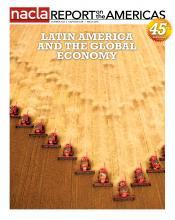Report
The new face of global capitalism is everywhere in Latin America, from the fast-food chains and superstores that dominate local markets to vast new fields of soy run by transnational agribusiness.
Sara Kozameh and Rebecca Ray
South American economies have shown a common resilience in the face of the global economic crisis. There are two explanations: the successful development of the region’s export-oriented extractive industries and the successful creation of domestic markets via greater income equality.
South American economies have shown a common resilience in the face of the global economic crisis. There are two explanations: the successful development of the region’s export-oriented extractive industries and the successful creation of domestic markets via greater income equality.
In late 2011, Brazil surpassed Britain to become the sixth-largest economy in the world. But behind the scenes, the reality is far from optimistic. Inequality remains high, and Brazil’s economic growth is not only slower than other emerging economies’ but may not even be sustainable.
Latin America’s global trade and investment patterns have radically shifted over the past decade, as the region has dramatically expanded its economic relations with the Asia-Pacific countries, particularly China and India.
Ximena de la Barra and R. A. Dello Buono
The inaugural summit of the Community of Latin American and Caribbean States in December marked a significant step toward consolidating a system of regional integration that will operate as an alternative to the U.S.-dominated Organization of American States.
From Peru to Chile to Ecuador, the first three months of 2012 registered an astounding acceleration of the Latin American movements defending water and life against the mining industry, large hydroelectric dams, and monocultures.

